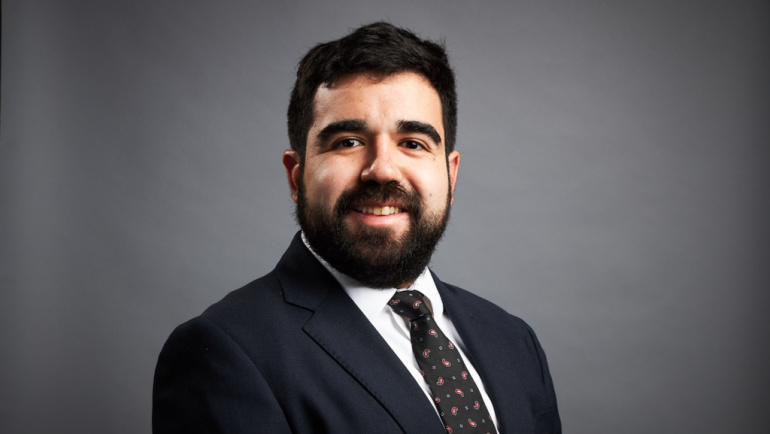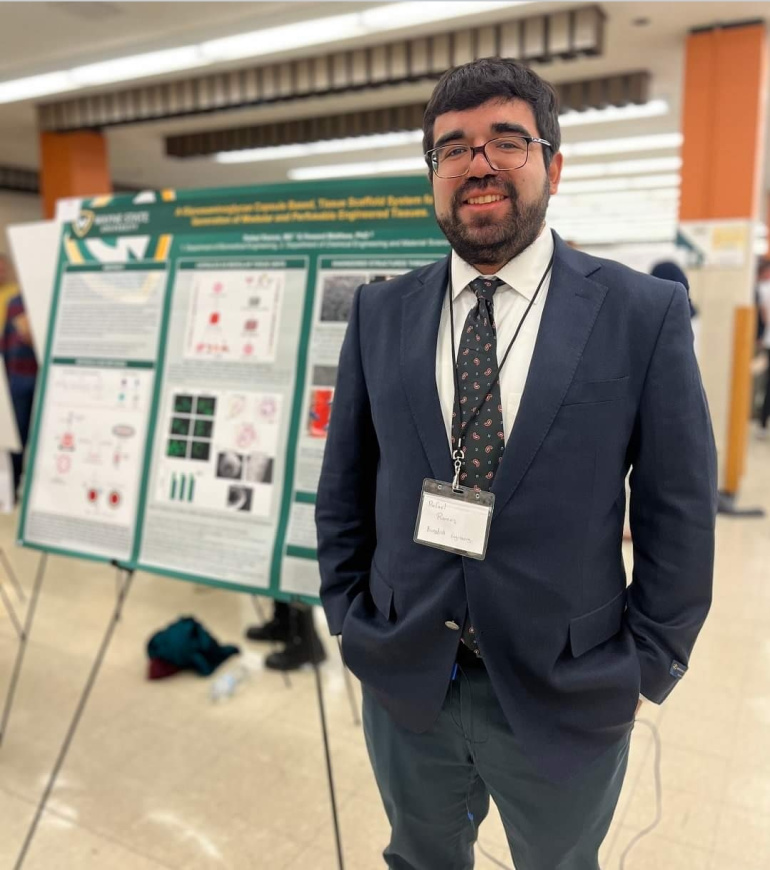
With a bachelor’s and master’s in biomedical engineering, Wayne State M.D./Ph.D. student Rafael Ramos has long dreamed of working at a place like NASA — and that dream came one step closer to reality when Ramos learned he had been awarded one of NASA’s Michigan Space Grant Consortium’s Graduate Fellowships.
“I wasn't expecting it,” Ramos said. “The last half of 2022 was really busy. We submitted three grant proposals, and the fact that I have been successful with two of these applications is really encouraging. It really incentivizes me to be very productive this year and during the remainder of my studies. It's very exciting that I have something that tangibly shows that I understand the project I'm working on and that there is scientific potential.”
Ramos said he is currently funded through the National Institutes of Health T32 Detroit Cardiovascular Training Program, hosted out of the School of Medicine’s Department of Physiology. His area of work is tissue engineering.
“That basically means we try to replicate body structures or organ structures the way they exist in the body, but through artificial means,” he said. “Organs like your kidney, liver or heart are very organized in terms of the materials they're made out of and how different cells are physically arranged. We try to look at these structures and replicate that through a number of manufacturing approaches and cell culturing approaches. And the aim to do that is to basically create what are called in-vitro models.”
Ramos is working with Professor of Chemical Engineering and Materials Science Howard Matthew on the project.
“Dr. Matthew’s work has taken the approach that, if you're trying to build these three-dimensional models, try to break that down into the smallest working parts, into individual modular units,” Ramos said. “Basically, the same way that you would build a Lego-like structure, you're basically making the individually tailored Lego pieces, and that just comes down to a combination of materials synthesis and cell combinations. And what we do is we make these little non-soluble hollow spheres, which we call microcapsules, and we're able to fill them with cells and different materials and then basically combine them together to build different tissues. You can then combine these capsules and build a larger construct.
“I'm currently working on a liver tissue engineering project. But given the engineering aspect, we really need to do a lot of work to tailor not only how I make these capsules, but also the materials that I make them out of. And that's really what we're going to be doing with this grant because we're going to take a lot of biological polymers, keep exploring them, maybe do some chemical modification as they do in the field, and basically tailor these environments to better replicate what’s happening inside a person’s liver. This will hopefully fit into my broader graduate research.”

Ramos said he’s very grateful to be working with Matthew and is looking forward to continuing his research with him.
“Dr. Matthew’s area of work was suited to the research that I did as an undergraduate and during my master's as a biomaterials scientist, and what I wished to continue during my dual degree studies,” Ramos said. “When I first joined his lab, we talked about a few projects, we talked about my research background and how it could fit in. And I realized that he was probably the best person I could work with. It's been really nice because he's a veteran in the field. This is a technique that he developed and pioneered himself, and he's had a number of graduate students develop different facets of this work.
“But what's been really nice is that he's giving me a lot of trust and a lot of flexibility in terms of how I plan my own project and the areas that I want to study. I have some good research goals that I've developed with him, and he's given me a lot of flexibility regarding the grants I apply for and the conferences I hope to present at, and the direction that I want to take my project. I consider myself very lucky to have him as a mentor.”
Ramos said he pursued the NASA fellowship because, as a dual M.D./Ph.D. student, he is interested in going into aerospace medicine.
“Dr. Matthew’s been really encouraging,” Ramos said. "Obviously, he's helped me develop projects, and we’ve tailored them appropriately. And I'm grateful that this was the first big state-funded grant that I wrote with him and it got funded. Hopefully, it sets the stage for the latter half of my graduate studies.”
The flexibility of Wayne State’s dual M.D./Ph.D. in terms of what he could study was a major draw for Ramos in choosing where to pursue his studies.
“I grew up in Mexico City, so I wanted to return to an urban environment for my M.D. studies, and coming to Wayne State, in Detroit, allowed me to do that,” Ramos said. “Also, the variety and scope of programs that I could get my Ph.D. in was really important. Sometimes, when you apply to M.D./Ph.D. programs, you have to get your Ph.D. in something that's typically more medical affiliated, so something like physiology or cancer biology. Wayne State gives us a full range. So we have people in computer science, chemistry and even anthropology — and I'm in biomedical engineering. Because of that fact, I think there's a lot of power in this program, and that was definitely one of the reasons I came because I didn't want to leave my engineering background behind. It also feels special being in Detroit, given this city’s history in both engineering and clinical advances. I wanted to find someone who did the kind of work that I wanted to go into, and finding Dr. Matthew as a Ph.D. mentor and advisor turned out to be a perfect fit.”
Ramos will finish his Ph.D. over the next few years before returning to medical school to complete his M.D.
“What I'm hoping is that the working relationship that I've established with the lab means I will be able to work Dr. Matthew for a couple of years to come,” Ramos said. "And really figure out how I integrate this aspect of research development with a potential medical career. I want to be a physician-scientist, specifically someone who works in the area of biomaterials and biomanufacturing, and this is still a burgeoning combination. I've been lucky that I've been able to talk with a couple of mentors, but I'm keeping my options open until I make it through the latter half of my M.D. studies. I want to make sure that I keep doing research in this area. I'm lucky that a lot of the experiences that I've had so far have given me a lot of training and a lot of exposure to new technologies that are available, technologies like 3D printing and smart material design that are already making a difference in the clinical world.”